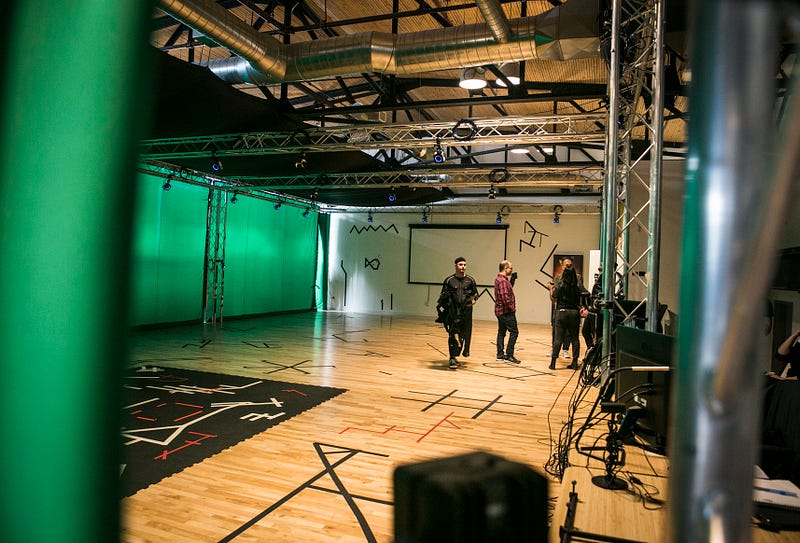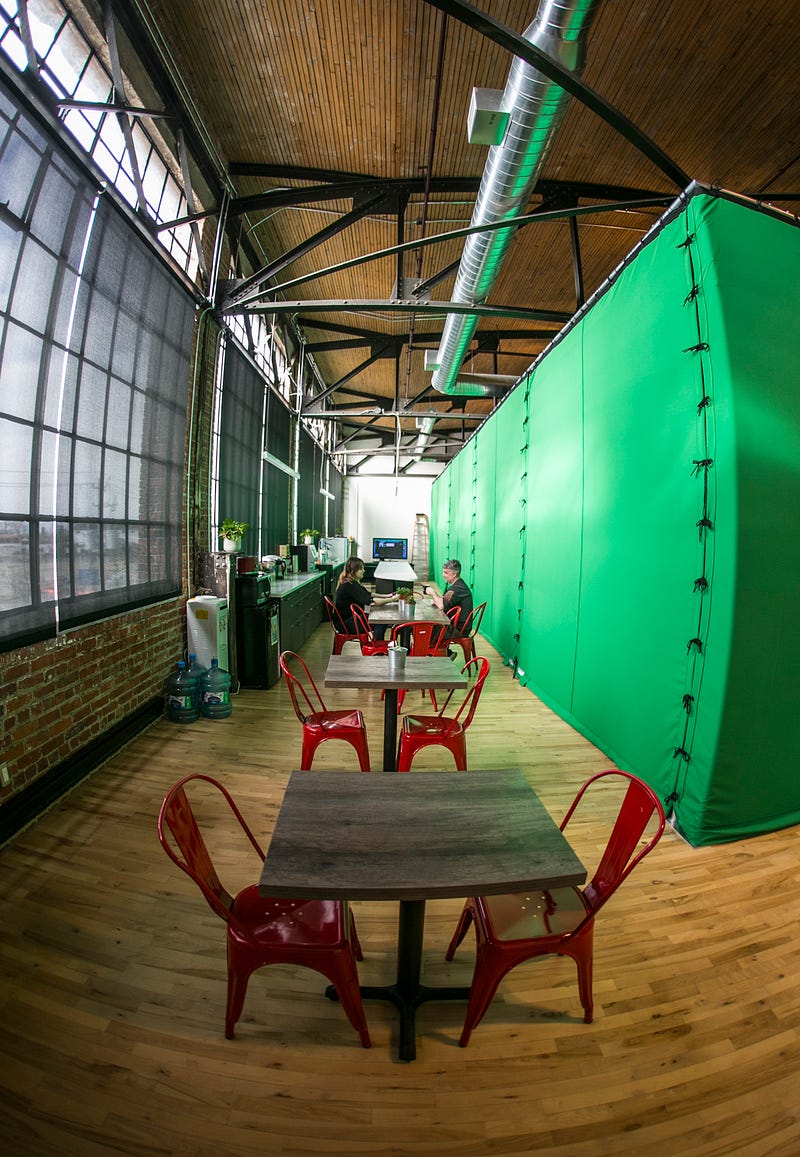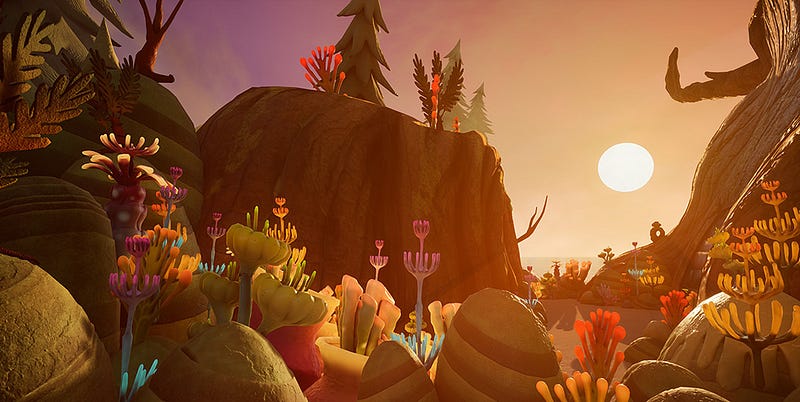
An interview with Dan Fill and Nathaniel Smith of Dark Slope Studios
The Virtual Production Bulletin is our new Q&A series about the intersection of game-engines, LED walls, real-time motion-capture, VFX and animation with documentary and non-fiction storytelling. It is co-produced with the Co-Creation Studio. How can we understand documentary techniques and ethics with new paradigms of virtual immediacy, abstraction or reenactment? What are the systems that enable and encourage such paradigms? And what other questions should we be asking about the blurring of virtual and physical space? Follow along as interviewer Srushti Kamat uncovers this landscape.
 Photo
courtesy of Dark Slope Studios
Photo
courtesy of Dark Slope StudiosHeadquartered in Toronto, Canada, Dark Slope Studios is a virtual-production company which opened in 2017. Dan Fill, president of the company, defines Dark Slope’s version of virtual production as a production with any of the following three core elements: a motion-tracking stage, a game engine and haptic components for location-based spectacles.
On July 12, 2021, Dark Slope launched a virtual production fellowship. They asked for factual entertainment pitches which incorporated virtual reality experiences, deepfaked facial-tracking and LED screens into a linear television workflow.
In other words: a new-age reality TV show.
As Annette Hill writes in her book Reality TV: Audiences and Popular Factual Television, ethics are crucial when the genre, sometimes called popular factual television, is located in “border territories,” between information and entertainment, documentary and drama.
That is, unscripted content, produced virtually, poses challenging questions about how media makers represent the world around us. Fellowships such as the one presented by Dark Slope also catalyze larger questions — how do gatekeepers facilitate a decision-making framework to judge the entertainment value and ethics of reality TV virtual productions? How far can we push the boundaries of realism and where and when should we examine limitations?
The following interview was conducted on Google Meets with Fill and development executive Nathaniel Smith of Dark Slope. It has been edited for length.
Srushti Kamat: Let’s dive in — what led to the fellowship?
Dan Fill: We think that there are a lot of programs that are improved by allowing people to have a more visceral experience. We also see audiences are looking for something a little more than just linear television. One area that we felt lends itself very well to this was reality TV. We thought we would throw it out to the general community and let people know we have resources while looking for people with creative ideas to really push what could be the next generation of television.
Nathaniel Smith: I think at the end of the day, we’re still telling those very human stories but figuring out ways in which technology is going to augment or help express them: Anything from making a talking head feel immersive to competition-based. And if you’re running through these types of virtual production pipelines because you’re motion tracking everything, you can play the day back infinitely in the game engine. It’s an absolute game changer for the traditional editing pipeline of factual and documentary, because you’re just able to consistently iterate on the message in real-time.
SK: So you’ve put out this fellowship and you’re asking for things that have never been done. How do you develop a decision-making mechanism to evaluate applications?
DF: We’ve got a development team and people who have a history of working in concepts for network TV. And then we have our virtual reality and game design side of things. So we understand some of the practical implications. We’re up-to-speed with what you can do with the software and what we can do with the hardware. What’s going on is the gamification of television. Even if it’s a nonfiction story, is there a beginning, middle and end? Is there some competition in there that’s going to allow for drama? Are we layering in some known game themes or behavior that is common in the gaming world?
NS: We really have gotten some cool submissions. I find the most successful are the ones where they’re using technology, to tell a human story. What’s the human problem that hits at our heart or our souls? Because those are the things that ultimately ended up mattering to any reality TV show. I used to work at The Bachelor Canada and on The Property Brothers. The Bachelor is not about love. It’s about social dynamics and social relationships, how people engage in new contexts, exploring those dynamics and bearing witness to it. Whereas The Property Brothers is about dream fulfillment. It’s about how to make someone’s dream home and give that to them.
SK: Reality TV has that element of involvement. One of the things I’m trying to challenge and think through with virtual production is that its terminology is accessible only to film, games, or tech folks. But what about audience awareness? Something like The Mandalorian involves a suspension of belief. But with reality TV, that suspension isn’t always potent. Things are perceived as “real.” So, I’m wondering how the fellowship is helping navigate the technology itself as part of the story?
 Photo
courtesy of Dark Slope Studios
Photo
courtesy of Dark Slope StudiosNS: Technology absolutely becomes part of the story. There are a lot of different game-type technologies and game-design mechanics that you can actually start bringing into challenges. Maybe it’s a dating show, but you’re simulated in space and you live on our stage for 30 days. Can you fall in love with someone in a space capsule? We could offer people avatars on a show that might be about you wanting to explore what it’s like to be a different kind of person. You could take on the role of a man if you’re a woman.
We want people that are sitting at home to say, “Hey, that could be me.” Imagine the potent power of storytelling especially for documentaries when you can have, say, a police officer, who’s all about Blue Lives Matter. Put him in a car where you simulate an overly aggressive cop pulling him over so that he literally puts himself in the shoes of what some other people experience, and how that shifts the dynamic of storytelling. To me, that falls under the purview of virtual production. It’s that simulation technology. It’s pushing people towards different human experiences and we’re just there to capture that and bring it to the world.
SK: We’re talking about things like empathy and putting oneself in another’s shoes. What are the conversations that you guys are having with each other around the ethical considerations of the fellowship?
DF: I mean, for us, it starts with the values of the company. We have to make some decisions about the types of content we want to put into the world. And certainly, there are VR games that are just torturing people. We’re in the softer entertainment space, for the most part. We’re trying to be careful about putting good things into the world. We’re also exploring themes that are somewhat comedic.
 Screenshot from Scary Girl. Courtesy of Dark Slope
Studios
Screenshot from Scary Girl. Courtesy of Dark Slope
StudiosSK: If something is good in one form, is it good in another? Can it perpetuate second-hand trauma? If you’re putting this new fellowship out there and asking people to really learn from scratch sometimes, I wonder if you can broach such questions.
NS: That’s definitely something that we’re looking for when we’re filtering through our fellowship applications. Some of them didn’t feel right. I’m a believer in the idea that people will try their best to do good with what they can. So, we try and feel it out. Is this genuine? Does this have a good motive and a wholesome ethic behind it? Because there are shows that I worked on, like The Bachelor, where I did not feel good on production at all. I don’t want to do that anymore. We’re doing our best to try and filter the things that end up giving us the most pride in our own work.
DF: I also think there are places for all of those shows. Something like The Bachelor Canada is extremely popular and it’s got a massive following and we have a great deal of respect for those kinds of programs as well. For many people, it’s an aspirational thing. But the thing that really struck us about our first project, Scary Girl (a game-style and environment-based VR experience), was the sense of spectacle. We loved the fact that people never experienced anything like this before. That’s what we’re aiming for, even in TV.
For more news, discourse, and resources on immersive and emerging forms of nonfiction media, sign up for our monthly newsletter.
Immerse is an initiative of the MIT Open DocLab and Dot Connector Studio, and receives funding from Just Films | Ford Foundation and the MacArthur Foundation. The Gotham Film & Media Institute is our fiscal sponsor. Learn more here. We are committed to exploring and showcasing emerging nonfiction projects that push the boundaries of media and tackle issues of social justice — and rely on friends like you to sustain ourselves and grow. Join us by making a gift today.